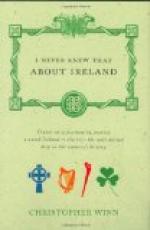And he ends by this remarkable assertion:—
“The whole machinery of the Court must be remodelled if it is to possess the confidence of the public. As it is at present composed, it is too much subject to political influence and to the clamour of one set of litigants to be independent. There are few of your readers, I believe, who will not admit that it is a very alarming thing to find a Court so constituted having the control of millions. The only officials ever connected with the Court in which there was any degree of confidence were the Court valuers attached to the Appeal Court. They were men of independence and impartiality, but they were dispensed with in a vain attempt to satisfy Mr. Parnell. I see by Mr. Balfour’s statement in the House of Commons on the 25th ult. that the Chief Commissioners are again engaged in framing new rules with regard to appeals. One would think that at the end of eight years they would have had their rules complete, and that an alteration every three months during that period ought to have brought them to perfection. How long is this farce to continue? These are serious complaints against a public body intrusted with the administration of justice. They do not deserve to be lightly passed over, and I am confident that, even should it suit the convenience of the present Government to follow the example of their predecessors and ignore them, the English people, with their strong sense of justice, will eventually insist on the unfair treatment and glaring injustice and abuses complained of being set right, and that those who have from political motives and influence been placed in honourable and responsible judicial positions shall give place to impartial men, who will deal out even-handed justice to the landlord as well as to the tenant.—I remain your obedient servant,
“JESSE LLOYD, Lieutenant-Colonel and J.P.,
“Agent for Lord Rossmore.
“Rossmore Agency Office, Monaghan.”
Here, then, is the reverse of the medal. Hitherto the outcry has been all for the tenant, and I do not say for a moment that this outcry was not just. It was. The Irish peasant has had his wrongs, deep and shameful; but now justice has been done to him so amply that the overflow has gone to the other side. It is time to look at things as they are, and to let well alone. Justice to the one has broadened out into persecution of the other, and an Irish landlord is for the moment the favourite cock-shy for aggressive legislation. But, as I have said before, prejudice dies hard, and sentimental pity is often only prejudice in a satin cloak. The Irish peasant is still assumed to be a helpless victim, the Irish landlord a ruffianly tyrant; and a state of things as obsolete as the Ogham language itself still rouses active passion as against a living wrong. I go back to that statement in the Pall Matt Gazette, to which I have before alluded, as an instance of the way in which the very froth of prejudice and falsehood is whipped up into active poison by the short and easy way of imagination and assertion. It is a fair sample of all the rest; but these are the things which find credit with those who do not know and do not enquire.




